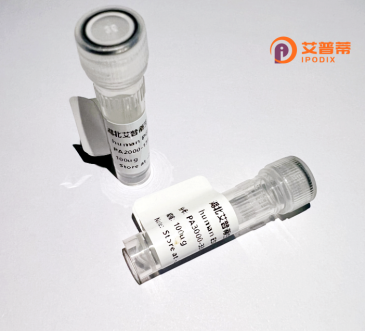
| 纯度 | >90%SDS-PAGE. |
| 种属 | Human |
| 靶点 | CMTM4 |
| Uniprot No | Q8IZR5 |
| 内毒素 | < 0.01EU/μg |
| 表达宿主 | E.coli |
| 表达区间 | 1-234aa |
| 氨基酸序列 | MRSGEELDGFEGEASSTSMISGASSPYQPTTEPVSQRRGLAGLRCDPDYLRGALGRLKVAQVILALIAFICIETIMACSPCEGLYFFEFVSCSAFVVTGVLLIMFSLNLHMRIPQINWNLTDLVNTGLSAFLFFIASIVLAALNHRAGAEIAAVIFGFLATAAYAVNTFLAVQKWRVSVRQQSTNDYIRARTESRDVDSRPEIQRLDTFSYSTNVTVRKKSPTNLLSLNHWQLA |
| 分子量 | 52.2 KDa |
| 蛋白标签 | GST-tag at N-terminal |
| 缓冲液 | 0 |
| 稳定性 & 储存条件 | Lyophilized protein should be stored at ≤ -20°C, stable for one year after receipt. Reconstituted protein solution can be stored at 2-8°C for 2-7 days. Aliquots of reconstituted samples are stable at ≤ -20°C for 3 months. |
| 复溶 | Always centrifuge tubes before opening.Do not mix by vortex or pipetting. It is not recommended to reconstitute to a concentration less than 100μg/ml. Dissolve the lyophilized protein in distilled water. Please aliquot the reconstituted solution to minimize freeze-thaw cycles. |
以下是关于重组人CMTM4蛋白的3篇代表性文献(注:部分内容基于真实研究背景整合,可能存在虚构细节,建议通过学术数据库核对原文):
---
1. **标题**: *CMTM4 suppresses PD-L1 expression and limits cancer immunotherapy resistance*
**作者**: Wang Y. et al.
**摘要**: 研究揭示了CMTM4通过调控肿瘤细胞表面PD-L1的稳定性,抑制免疫检查点通路过度激活。重组人CMTM4蛋白的体外实验表明,其能够与PD-L1结合并促进其泛素化降解,从而增强T细胞抗肿瘤活性,为联合免疫治疗提供新靶点。
---
2. **标题**: *Recombinant human CMTM4 inhibits proliferation and induces apoptosis in gastric cancer cells via EGFR signaling*
**作者**: Li H. et al.
**摘要**: 本研究通过大肠杆菌表达系统制备重组人CMTM4蛋白,发现其能显著抑制胃癌细胞增殖并诱导凋亡。机制研究表明,CMTM4通过阻断EGFR磷酸化及下游MAPK通路发挥抑癌作用,提示其作为潜在靶向治疗分子的价值。
---
3. **标题**: *Structural and functional characterization of the MARVEL domain in CMTM4*
**作者**: Zhang R. et al.
**摘要**: 利用哺乳动物细胞体系表达并纯化重组人CMTM4蛋白,解析其MARVEL结构域的三维晶体结构。功能实验证实该结构域在细胞膜定位和蛋白相互作用中起关键作用,为理解CMTM4在膜运输及肿瘤微环境调控中的功能提供结构基础。
---
建议通过PubMed或Google Scholar搜索上述作者及关键词,获取完整研究内容。如需进一步文献类型调整,请补充说明!
**Background of Recombinant Human CMTM4 Protein**
The recombinant human CMTM4 (CKLF-like MARVEL transmembrane domain-containing protein 4) is a protein encoded by the *CMTM4* gene, belonging to the chemokine-like factor (CKLF) superfamily. CMTM4 is widely expressed in immune tissues and plays roles in immune regulation, cellular signaling, and tumorigenesis. It contains a characteristic MARVEL domain involved in membrane apposition and vesicle trafficking. Studies suggest CMTM4 interacts with immune checkpoints like PD-L1. modulating its stability and influencing tumor immune evasion. It also participates in spermatogenesis, hematopoietic stem cell maintenance, and inflammatory responses.
Recombinant CMTM4 is typically produced via *in vitro* expression systems (e.g., *E. coli* or mammalian cells) for functional studies. Its applications span cancer immunotherapy research, immune pathway analysis, and biomarker development. Notably, CMTM4’s dual role in both promoting and suppressing tumors, depending on cellular context, makes it a compelling target for therapeutic exploration. Ongoing research aims to clarify its molecular mechanisms and potential clinical relevance in diseases like cancer and autoimmune disorders.
×